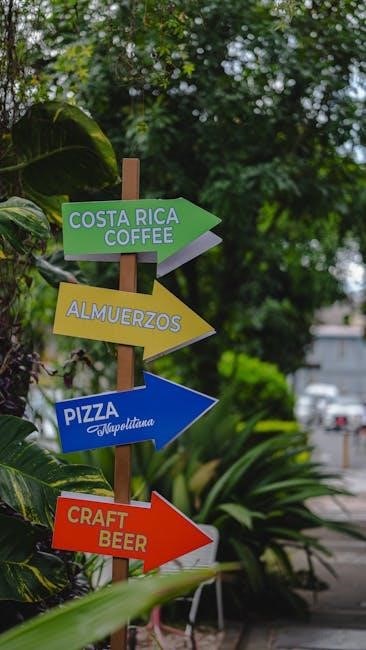primer paso a.a. pdf
The First Step of Alcoholics Anonymous (A.A.) is a cornerstone of recovery, requiring individuals to acknowledge their powerlessness over alcohol and the unmanageability of their lives. This admission is crucial for beginning the healing journey, addressing denial, and embracing transformation. It emphasizes the importance of surrender and humility, laying the foundation for spiritual growth and long-term sobriety. By confronting the reality of addiction, individuals open themselves to support and guidance, fostering a path toward a fulfilling and purposeful life free from alcohol’s grip.
Overview of Alcoholics Anonymous (A.A.)
Alcoholics Anonymous (A.A.) is a global fellowship founded in 1935 by Bill W. and Dr. Bob S., offering a supportive environment for individuals seeking recovery from alcoholism. The program is based on the 12-Step model, which provides a structured path toward sobriety and personal growth. Central to A;A.’s philosophy is the principle of mutual aid, where members share their experiences and strengths to help others achieve and maintain sobriety. The organization emphasizes anonymity, inclusivity, and spirituality, though it is not affiliated with any religion or institution. Meetings are conducted in various languages worldwide, reflecting its diverse and widespread reach. A.A.’s core literature, including “Alcoholics Anonymous” (the Big Book) and “Twelve Steps and Twelve Traditions,” serves as a guide for members. The First Step, admitting powerlessness over alcohol, is foundational to the program, encouraging individuals to confront their addiction and seek help. This step is often described as the starting point for transformation and recovery.
The Significance of the First Step in A.A.
The First Step in Alcoholics Anonymous holds profound significance as it marks the beginning of the recovery journey. By admitting powerlessness over alcohol and acknowledging the unmanageability of their lives, individuals confront the reality of their addiction. This step is essential for breaking through denial and resistance, which often hinder progress. It establishes a foundation for humility and openness, allowing members to seek help and embrace the program’s spiritual principles. The First Step is not merely an admission of defeat but a courageous acceptance of one’s limitations, paving the way for transformation. It is the cornerstone of the 12-Step program, enabling individuals to move forward with honesty and willingness. This initial surrender is often described as the catalyst for spiritual awakening and long-term sobriety, emphasizing the importance of humility and the need for a higher power in the recovery process.
Historical Background of A.A. and the First Step
Alcoholics Anonymous (A.A.) was founded in 1935 by Bill W. and Dr. Bob S., with the First Step emerging as a critical component of their recovery approach. Initially, the program focused on individuals who had “hit bottom,” emphasizing total defeat as a prerequisite for transformation. This historical context shaped the First Step’s emphasis on admitting powerlessness and unmanageability, laying the groundwork for the 12-Step program’s development.
Founding of A.A. and Its Core Principles
Alcoholics Anonymous (A.A.) was founded in 1935 by Bill W. and Dr. Bob S., with the First Step emerging as a critical component of their recovery approach. Initially, the program focused on individuals who had “hit bottom,” emphasizing total defeat as a prerequisite for transformation. This historical context shaped the First Step’s emphasis on admitting powerlessness and unmanageability, laying the groundwork for the 12-Step program’s development.
Evolution of the 12-Step Program
The 12-Step program of Alcoholics Anonymous evolved from the early experiences of its founders, Bill W. and Dr. Bob S., who recognized the need for a structured approach to recovery. Initially, the program was rigid, focusing on individuals who had “hit bottom,” as described in the first edition of Alcoholics Anonymous (1939). Over time, the program adapted to include a broader range of members, including younger individuals who had not experienced extreme desperation. The publication of Twelve Steps and Twelve Traditions in 1953 further refined the principles, offering deeper insights into each step. This evolution ensured the program’s accessibility and effectiveness for diverse individuals, emphasizing the importance of the First Step in breaking denial and enabling personal transformation. The adaptability of the 12-Step program has been key to its enduring success, providing a universal framework for overcoming addiction.

The First Step Explained
The First Step involves admitting powerlessness over alcohol and recognizing the unmanageability of life. It requires surrendering denial and embracing humility, marking the beginning of the recovery journey. This foundational step fosters spiritual awakening and transformation.
Definition and Key Concepts
The First Step of Alcoholics Anonymous (A.A.) is defined as admitting powerlessness over alcohol and acknowledging the unmanageability of one’s life. This step is foundational, requiring individuals to confront their inability to control alcohol use and the resulting chaos in their lives. Key concepts include powerlessness, which refers to the loss of control over drinking, and unmanageability, describing the negative impact on personal and professional life. Surrendering denial and embracing humility are essential for progress. This step is not about weakness but about recognizing the limitations of self-reliance. By admitting defeat, individuals open themselves to spiritual guidance and support, marking the beginning of recovery. This admission is crucial for breaking the cycle of addiction and building a foundation for future growth and transformation.
Psychological and Emotional Aspects
The First Step of A.A. involves profound psychological and emotional challenges, as individuals confront their powerlessness over alcohol and the unmanageability of their lives. Admitting defeat is often met with resistance, as it contradicts the natural human instinct to maintain control. Many struggle with denial, unable to accept the severity of their addiction. Emotionally, this step requires surrendering pride and embracing vulnerability, which can evoke feelings of shame, fear, and anxiety. The process of admitting powerlessness is a pivotal moment of self-awareness, breaking through the barriers of ego and self-reliance. It allows individuals to release the burden of trying to manage their addiction alone and opens the door to spiritual and emotional healing. This step is transformative, enabling people to confront their inner struggles and begin rebuilding their lives with humility and courage. It marks the start of a journey toward emotional stability and long-term recovery.
Spiritual Dimensions of the First Step
The First Step of Alcoholics Anonymous carries deep spiritual significance, encouraging individuals to acknowledge a power greater than themselves. Recognizing one’s powerlessness over alcohol often leads to a spiritual awakening, as individuals realize the need for guidance beyond their own control. This step fosters humility and openness to a Higher Power, which becomes a cornerstone of recovery. Many find solace in the belief that they are not alone in their struggle, and this realization brings comfort and strength. The spiritual aspect of admitting powerlessness allows individuals to let go of self-reliance and embrace a faith that supports their journey toward sobriety. By surrendering to a Higher Power, they gain the courage to confront their addiction and begin rebuilding their lives with purpose and meaning. This spiritual foundation is essential for navigating the challenges of recovery and achieving lasting transformation.

Challenges and Obstacles in Admitting Powerlessness
Challenges in admitting powerlessness include denial, resistance, and pride. Many struggle with accepting their inability to control alcohol and acknowledging the unmanageability of their lives, fearing judgment and loss of autonomy.
Common Barriers to Acceptance
One of the most significant barriers to accepting the First Step is denial, where individuals minimize or rationalize their alcohol use. Many struggle to acknowledge the true extent of their addiction, often believing they can still control their drinking. Pride and fear of stigma also prevent individuals from admitting their powerlessness, as societal perceptions of weakness may discourage honest self-reflection. Additionally, the fear of change and the unknown journey of recovery can be overwhelming, leading to resistance. The emotional difficulty of confronting past mistakes and the belief that they can overcome addiction alone further compounds these challenges. These barriers highlight the importance of a supportive environment and the need for gentle guidance to help individuals move past their defenses and embrace the First Step. By addressing these obstacles, individuals can begin to break down the walls that prevent them from seeking help and starting their recovery journey;
Addressing Denial and Resistance
Denial and resistance are natural responses when confronting the reality of powerlessness over alcohol. Many individuals struggle to accept that their lives have become unmanageable, often due to pride or fear of being labeled as powerless. To overcome this, it is essential to create a safe and non-judgmental space where individuals feel comfortable sharing their experiences. Education about the nature of addiction and the principles of the First Step can help dispel misconceptions and reduce resistance. Additionally, hearing personal stories from others who have successfully worked the First Step can inspire hope and encourage openness. Empathy and understanding are key, as individuals need to feel supported rather than criticized. By gently guiding them to reflect on their own experiences and the consequences of their actions, they can begin to break through denial and embrace the truth. This process is not about shame but about liberation and the possibility of a better life.

Solutions and Strategies for Working the First Step
Embracing the First Step requires honesty, self-reflection, and willingness to surrender. Seeking guidance from sponsors or mentors can provide clarity and support. Sharing experiences in meetings fosters connection and understanding. By acknowledging limitations and embracing vulnerability, individuals can move past denial and resistance, paving the way for transformation and growth.
Practical Steps to Acknowledge Powerlessness
Acknowledging powerlessness is a foundational process in the First Step of A.A. It begins with self-reflection, where individuals examine their past experiences and the impact of alcohol on their lives. Writing a personal inventory of how alcohol has caused unmanageability can provide clarity. Sharing this inventory with a sponsor or trusted friend helps in confronting denial and resistance. Attending A.A. meetings offers a supportive environment where others share similar journeys, reinforcing the reality of powerlessness. Prayer and meditation can also aid in surrendering control, fostering a spiritual awakening. By taking these practical steps, individuals can move beyond denial and embrace the humility necessary for recovery. This process is not about weakness but about accepting reality and opening oneself to the possibility of change and healing.
Building a Supportive Environment
Creating a supportive environment is essential for individuals working through the First Step of A.A. This begins with establishing a strong connection to the A.A. community, where shared experiences and testimonios inspire hope and understanding. Regular attendance at meetings provides a safe space for open discussion and mutual encouragement. Sponsors play a vital role, offering guidance and personal support as individuals navigate their recovery journey.
A supportive environment also involves fostering a sense of belonging, which helps individuals stay committed to their recovery. Sharing stories of struggle and triumph reinforces the idea that no one is alone in their journey. Additionally, spiritual practices such as prayer and meditation can create a sense of calm and clarity, aiding in the process of surrender and acceptance.
By surrounding themselves with understanding peers and spiritual guidance, individuals can more effectively confront their powerlessness and begin to rebuild their lives. This environment of trust and connection is a cornerstone of the A.A. program, helping members take their first steps toward healing and recovery.

Personal Stories and Testimonials
Personal stories and testimonials from A.A. members provide powerful inspiration, sharing real-life experiences of struggle, surrender, and recovery. These accounts foster connection and hope, encouraging individuals to confront their powerlessness and find strength in shared experiences.
Real-Life Examples of Working the First Step
Many A.A. members share their journeys of working the First Step, illustrating how admitting powerlessness transformed their lives. One member recounted hitting rock bottom, losing relationships, and facing legal issues due to alcohol, yet couldn’t stop. Only after acknowledging their inability to control drinking did they find the courage to seek help. Another story highlights a member who struggled for years, trying to moderate drinking but failing repeatedly. After surrendering and admitting defeat, they experienced a profound shift in perspective, embracing the Program and beginning recovery. These testimonials emphasize that the First Step is not about weakness but about courage to confront reality, paving the way for healing and growth.

Impact and Effectiveness of the First Step
The First Step’s transformative power lies in its ability to break denial, fostering liberation and strength. It creates a foundation for recovery, helping individuals shift from resistance to acceptance, enabling profound, lasting change.
Transformative Power of Admission
The transformative power of admitting powerlessness in the First Step lies in its ability to shatter denial and resistance. By acknowledging their inability to control alcohol and the unmanageability of their lives, individuals open themselves to profound change. This admission is not a sign of weakness but a courageous step toward liberation and growth. It allows individuals to confront the reality of their addiction, embrace humility, and seek help. Through this process, they begin to dismantle the barriers that have long sustained their addiction, creating a foundation for spiritual and emotional healing. The act of admission becomes a catalyst for transformation, enabling individuals to move beyond the grip of alcohol and toward a life of purpose and fulfillment. This step is often described as the cornerstone of recovery, marking the beginning of a journey toward lasting sobriety and personal renewal.
Long-Term Recovery Outcomes
Engaging with the First Step of Alcoholics Anonymous leads to profound long-term recovery outcomes, fostering sustained sobriety and personal growth. By admitting powerlessness and unmanageability, individuals often experience a spiritual awakening that reshapes their lives. Many report improved relationships, emotional stability, and a renewed sense of purpose. The process encourages self-reflection and accountability, equipping individuals with tools to navigate life’s challenges without alcohol. Over time, this foundational step helps build resilience, reducing the likelihood of relapse. The supportive community of A.A. further enhances these outcomes, providing ongoing encouragement and guidance. While recovery is a lifelong journey, the transformative power of the First Step lays a strong foundation for long-term success. Ultimately, it empowers individuals to lead fulfilling lives, free from the grip of addiction, and to find peace and meaning in their newfound sobriety.

Resources and Further Reading
Key resources include the Guía de Estudio Del 1º Paso (PDF), Alcohólicos Anónimos (Big Book), and Doce Pasos y Doce Tradiciones. These materials provide in-depth insights and practical guidance for working the First Step effectively.
Recommended Literature and Guides
The key literature for understanding the First Step includes the Big Book of Alcoholics Anonymous, which provides foundational insights into the program. The chapter “How It Works” elaborates on the importance of admitting powerlessness. Additionally, Twelve Steps and Twelve Traditions (commonly known as the “12 and 12”) offers detailed explanations of each step, including the First Step. For Spanish-speaking members, the Guía de Estudio Del 1º Paso (available as a PDF) is an invaluable resource, offering questions and answers to deepen understanding. These materials are essential for anyone seeking to fully grasp the principles of the First Step and apply them in their recovery journey. They provide practical guidance, personal stories, and spiritual insights, making them indispensable tools for growth and transformation.











Leave a Comment